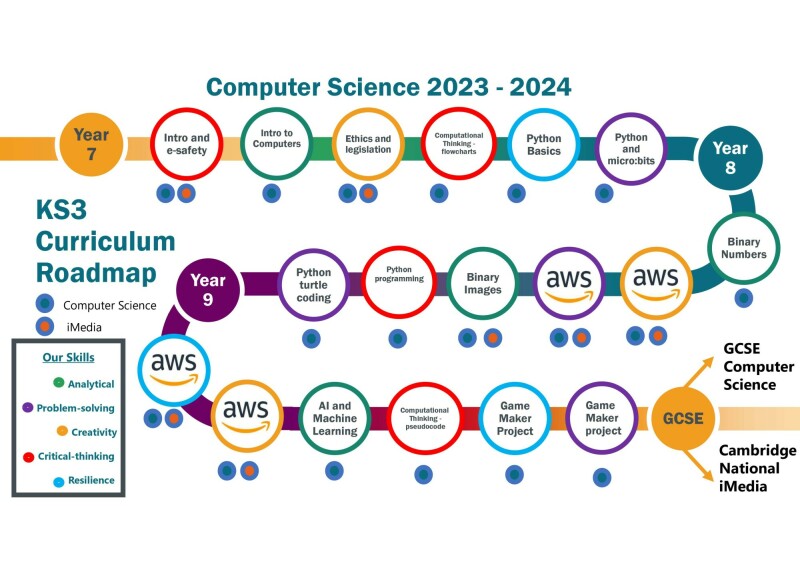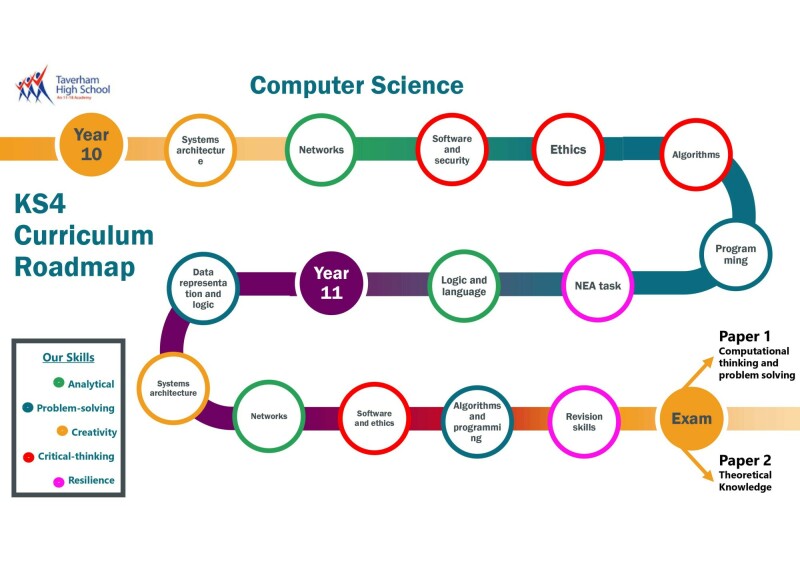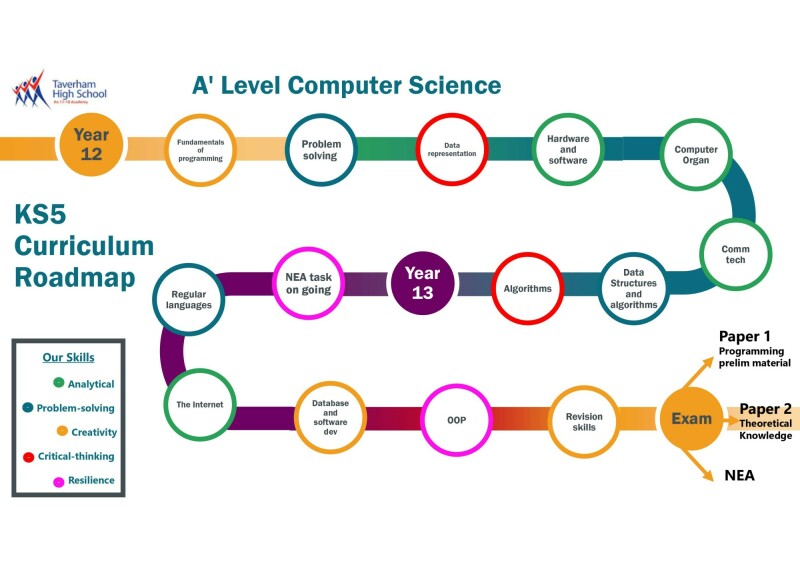Computer Science
Key Stage 3 Computing
The Key Stage 3 computing curriculum combines technical knowledge with creativity, developed through a range of units. Students have two lessons a fortnight and each half term covers a new unit, developing skills as they progress through the years. The curriculum will prepare them for GCSE when they have the option of GCSE Computer Science and Cambridge National in iMedia.

Students will learn:
- how computers work
- how we communicate via networks and the internet
- to recognise threats to data and security
- how to reduce risks
- digital editing
They will also learn transferable skills such as:
- word processing
- presentation
- internet research
Students in Key Stage 2 are likely to have been taught block codes such as Scratch. At Key Stage 3 we will teach Python as a high-level language. We explore algorithms, program design, program writing and debugging.
GCSE Computer Science
Examination Board OCR
Intent
In computer science, we encourage students to:
- understand and apply the fundamental principles and concepts of computer science, including abstraction, decomposition, logic, algorithms, and data representation
- analyse problems in computational terms through practical experience of solving such problems, including designing, writing and debugging programs
- think creatively, innovatively, analytically, logically and critically
- understand the components that make up digital systems, and how they communicate with one another and with other systems
- understand the impacts of digital technology to the individual and to wider society
- apply mathematical skills relevant to computer science

Assessment
Students take J277/01 and J277/02 to be awarded the OCR GCSE (9–1) in Computer Science.
There are two theoretical papers. The first introduces students to the central processing unit (CPU), computer memory and storage, data representation, wired and wireless networks, network topologies, system security and system software. It also looks at ethical, legal, cultural and environmental concerns associated with computer science. The second paper applies knowledge and understanding gained in the first. They develop skills and understanding in computational thinking: algorithms, programming techniques, producing robust programs, computational logic and translators. Students develop their Python programming from Key Stage 3 in practical applications and then are tested on them during the second paper.
Written Paper 1: 1 hour 30 minutes - 50% of total GCSE / 80 marks
This is a non calculator paper, consisting of multiple choice questions, short response questions and extended response questions
Written Paper 2: 1 hour 30 minutes - 50% of total GCSE / 80 marks
This is made up of 2 sections, assessing students' ability to write or refine algorithms
Practical Programming
All students must be given the opportunity to undertake a programming task, either to a specification or to solve a problem (or problems), during their course of study. Students may draw on some of the content in both components when engaged in Practical Programming.
A-Level Computer Science
Examination Board: AQA
Intent
Computer science is the study of the theory, experimentation and engineering that form the basis for the design and use of computers. A challenging field, the emphasis of this course is on computational thinking and problem solving. Students begin their studies with a Computer Science AS level and progress onto the Computer Science A-level. The course is complemented with an industry standard CompTIA A+ learning. This offers a real application to industry.
Subject Content
Over the two years students will cover:
- fundamentals of programming
- fundamentals of data structures
- systematic approach to problem solving
- theory of computation
- fundamentals of data representation
- fundamentals of computer systems
- fundamentals of computer organisation and architecture
- consequences of uses of computing
- fundamentals of communication and networking
- fundamentals of algorithms
- fundamentals of databases
- Big Data
- fundamentals of functional programming
- systematic approach to problem solving
In addition, the non-exam assessment (NEA) assesses the student's ability to use the knowledge and skills gained through the course to solve or investigate a practical problem. Students will be expected to follow a systematic approach to problem solving.

Assessment
AS Paper 1: on screen exam - 1 hour 45 minutes - 50%
AS Paper 2: written exam - 1 hour 30 minutes - 50%
A-level Paper 1: on screen exam - 2 hours 30 minutes - 40%
A-level Paper 2: written exam - 2 hours 30 minutes - 40%
Non exam assessment: 20%.
Careers and Progression
Computing is the fastest growing sector in industry. Any career or further education course involving computing would benefit from this A-level. You can study computer science and go on to a career in medicine, law, business, engineering or any type of science. This course feeds into computer science studies or university courses for those who wish to progress into writing their own programs/games/apps/software. It is also suitable for those wishing to have a greater insight into how PCs actually work, which would suit those whose career will take them heavily into ICT as every industry uses computers in one way or another so the potential of future employment is high.
Entrance Requirements
Minimum requirement: 6 GCSEs Grades 9-4 (or equivalent), including Grade 4 or above in English and maths
Strongly recommended: Grade 5 in maths
Recommended: Grade 5 in computer science/ICT
